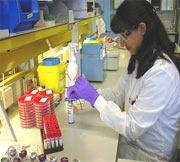The plans roll into practice - worse shifts for less money!
The first stage of the strategy involves Birmingham and Southampton donor testing labs closing in December 2007 and their work transferring down to Bristol. This will be the current Southmead site as the supercentre at Filton is still mud and girders. It is madness to expect a lab already operating at full capacity to take on two extra centres' workload. The staff will suffer the brunt of the effects of this overstretch.

There is a shortage of state-registered bio-medical scientists at Southmead. This will create problems when taking holidays or covering sickness and training requirements.
Unions say the proposed new shift patterns are seriously flawed. In-keeping with all of this strategy there is contradiction, waste of labour and lack of solid contingency planning. Illogical deadlines will cause periods of intense pressure followed by ‘dead time’.
Bristol testing staff will face many more early starts, which could be avoided if directors properly consulted staff-side about best working patterns. There is little flexibility available for parents or those reliant on public transport. This also comes at a time when health workers’ payments for Unsocial Hours are under threat. Unions believe NBS management may be trying to sidestep Agenda for Change protection of Unsocial Hours payments, as the wording describing an interim transition period says ‘existing arrangements continue undisturbed’.
It is important that the views of experienced health staff are listened to at this point, as the progress in the Midlands and South-West zone will be a template for the rest of the country. Bristol testing must not be railroaded into an unsuitable or unworkable shift system.
Here is a resolution passed unanimously by Amicus in Testing, Colindale.
Resolution on Proposed Shift System for Testing in Bristol
Staff in Colindale Testing Department view the proposed Working Patterns and Staffing Structure for Testing at Bristol Southmead with deep concern.
We are concerned about:
(a) the effect which these proposals, if implemented, will have on the lives of our colleagues in Bristol, Birmingham and Southampton.
(b) the probability that whatever is implemented in the Midlands and South West will shortly afterwards be implemented in the North and in London and the South East.
(c) the 6.00 a.m. start, which would be impossible for parents of young children or for staff who travel to work by public transport.
(d) the week-day shifts taking place at four different times of day, the latest ending at 11.00 p.m., plus a different two-shift pattern at week-ends, with consequent large changes in sleep patterns and meal-times that will affect the health of staff.
(e) the inclusion of 46 working days, instead of the normal 45, in the 9 weeks, and the 5 days per year to be used as a contingency, which taken together would give staff an extra 11 working days per year, when they would travel to work in their own time and at their own expense.
(f) the Saturday working, which would be difficult for parents of young children and for those who travel to work by train, (because the engineering work on the tracks is done at week-ends), and would also discriminate against some religious groups.
(g) the staffing structure, which would approximately halve the number of Biomedical Scientists in Testing in the Midlands and South West, leaving an inadequate number of state registered staff to cope with the workload.
(h) the probability that the training week would actually be used to cover staff shortages.
(i) the shortening of the tea-breaks to 2 X 15 minutes, when the present 20 minute breaks at Colindale are sometimes inadequate because of the queue in the tea-room.
We find the proposals inconsistent with the aims of Improving Working Lives, and believe that the NHSBT will not get the best possible work out of staff who are unable to arrange good care for their children and whose own health is suffering from the weekly changes in their working patterns.
We call upon the management to consider the following changes to their proposals:
* Keeping Processing and Testing at more than three sites, thereby reducing the necessity for very long opening hours at each site.
* The earliest starting time to be about 8.00 a.m., except where staff request to be allowed to start earlier,
* People with responsibility for young children to be allowed an earliest start time of 9.00 a.m. to fit their child-care arrangements.
* The employment of staff on fixed hours, some working always in the mornings and others always at later times, which would give them a better work-life balance, would not upset their biological clocks and would enable them to do better work.
* Keeping to a working week of 5 days of 7hrs 30mins each.
* Avoiding Saturday working by extra work on Fridays and Mondays, as happens at present in Colindale.
* Protecting training by employing more staff, including supernumerary trainers.
We pledge our total support to fellow members in Bristol.
If there is any attempt to impose the structure and hours in the Consultation Document on members at Bristol, we will request Amicus to ballot the members in all the Testing laboratories in the NBS for united industrial action.
Passed unanimously by Amicus members, Testing Department, NBS Colindale,
4th July 2007
Here is a resolution passed unanimously by Amicus in testing, Manchester.
Resolution on proposed shifts at Bristol
Testing staff at Manchester view the propposal tabled to the Bristol testing staff with deep concern and anger.
Anything agreed at Bristol has clear implifications for us and also staff at Colindale.
The hours are not easy to work, in particular the 6 am start and Saturday evening working, and are potentially discriminatory.
The staffing structure is inadequate to cope with such a workload; in particular there is a dire shortage of state registered staff with the only new posts being in the lower grades of Band 2, 3 and 4.
Also the 6 day weeks to cover Saturdays and the 5 days “banked” to cover Bank Holidays and weekends are totally unacceptable and not the best way to cover the work.
The combination of extra late, weekend and Bank Holiday working, the extra number of days worked per year, and the very early starts, make the whole system very family-unfriendly and incompattible with the avowed aims of IWL [Improving Working Lives].
Any such discussions should not form part of the SW redundancy discussion but should be a proper national negotiation with input from all affected sites.
In any case the only reason to work such anti-social shifts is to allow the NBS to close other Centres, making colleagues in other Centres redundant; if the NBS keeps a sensible number of PTI sites there will be no need to move to such extreme shifts.
We therefore call on the NBS to halt the strategy which centralises all donor testing work on just three sites.
We pledge our total support to fellow members in Bristol.
If there is any attempt to impose this structure and these hours on members at Bristol we will request Amicus to ballot the members in Manchester, Colindale and Bristol for united industrial action.
Passed unanimously by Amicus members, Testing department, Manchester Blood Centre, 14th June 2007
Labels: management strategy, unions


0 Comments:
Post a Comment
Subscribe to Post Comments [Atom]
<< Home